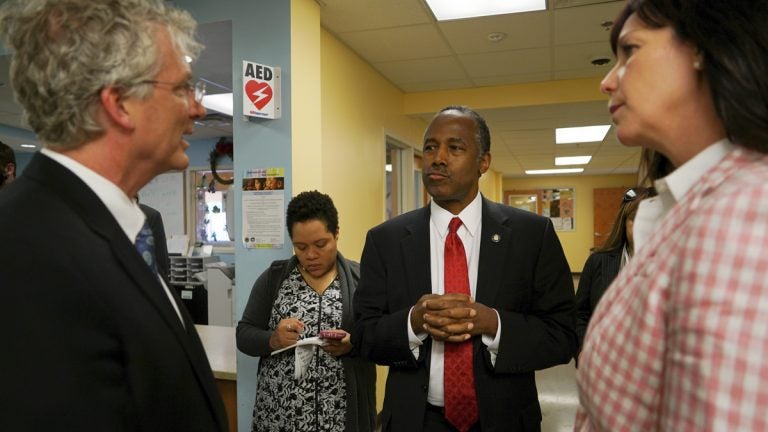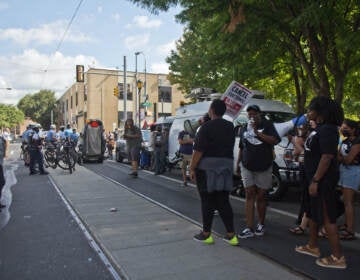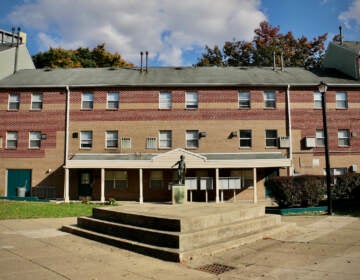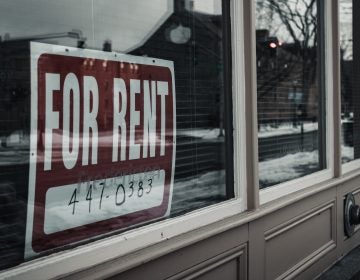As Carson visits Philly, let’s call for a stronger, fairer HUD

Ben Carson, secretary of Housing and Urban Development, is shown speaking with city and housing officials at a shelter in Columbus, Ohio, in April. (AP Photo/Dake Kang, file)
With so many crises since Donald Trump’s inauguration day in January, it’s hard to know where to place one’s attention. One government agency that is often overlooked is the Department of Housing and Urban Development.
With so many crises since Donald Trump’s inauguration day in January, it’s hard to know where to place one’s attention: the investigation into the Trump campaign’s alleged ties to Russian interference in the 2016 election, North Korea’s missile tests, a revolving door of staff changes in the White House, Republican attempts at health care reform, the administration’s reconsideration of Deferred Action for Childhood Arrivals, and inadequate responses to white supremacist marches. One government agency that is often overlooked is the Department of Housing and Urban Development. Today, HUD Secretary Ben Carson is visiting Philadelphia.
Philadelphia is in the midst of a housing crisis that has many fronts. According to the National Low Income Housing Coalition, a worker earning minimum wage ($7.25 per hour) who is renting a two-bedroom apartment will need to work 128 hours a week just to afford to spend 30 percent of his or her annual income on rent — a federally recommended proportion of income to spend on housing. The poorest big city in America might not have rent as expensive as San Francisco, but for too many, it is still unaffordable.
Affordability is not the only element of the Philadelphia housing crisis. Philadelphia is a city segregated by class and race. Of the cities with the largest black populations, Philadelphia is the sixth most segregated in America. A Pew Trust report from earlier this year found that, “in 84 percent of the city’s 372 residential census tracts, one group — African-Americans, Asians, Hispanics, or non-Hispanic whites — constitutes an absolute majority of the population.”
The same Pew report also shows that the median household income in Society Hill is almost six times higher than the median household income in East North Philadelphia — a gap of $84,632 a year.
Whites and people of color don’t typically live in the same Philadelphia neighborhoods. The rich and the poor don’t typically live in the same Philadelphia neighborhoods. This segregation has devastating impacts on people’s lives. Overlaying a map of educational attainment or lead poisoning incidence or eviction rate or life expectancy shows that the life of the affluent and white in Philadelphia is dramatically different from that of the poor person of color.
This dramatic difference didn’t happen by accident, by mistake, or by market forces. It happened because of intentional policy choices and is perpetuated because current policies are falling short of ensuring equitable housing for all.
The pediatric neurosurgeon turned presidential candidate turned HUD secretary has been praised for his understanding of the relationship between housing and health. Making sure that every child in the richest country in the world lives in a house free of mold and lead is critical. That said, healthy homes policies must go hand in hand with policies that maintain affordability, fairness, and stability.
The proposed HUD budget slashes funding to the agency by $6 billion. If the budget passes, programs that are critical to mitigate the housing crisis will be either eliminated or minimized. The budget does increase the funding for the lead prevention program. Carson is also expected to curtail the Obama-era Affirmatively Furthering Fair Housing rule, which Carson called “a mandated social-engineering scheme” that would be a “failed socialist experiment.”
In Philadelphia the wait for a housing voucher is 7-10 years. (It’s currently closed.) When the government pursues policies that impact one aspect of housing and ignores a policy that impacts a different aspect, it forces renters into a series of “Sophie’s Choices.”
Should I risk lead poisoning for my child or be burdened by the cost of rent?
Should I try to move to a different neighborhood and risk discrimination or stay in unhealthy housing?
Should I leave my community and the support that comes with it for an are with better schools?
The list goes on. No person living in the richest country in the world should have to make these terrible choices.
As Ben Carson comes to Philadelphia, we must stand together and call for a strong HUD that focuses on all elements of housing inequality and not just one while worsening others. Perhaps the city of Brotherly Love can convince Carson that his job is to help those struggling in housing markets, not to help Trump’s administration balance their budget.
WHYY is your source for fact-based, in-depth journalism and information. As a nonprofit organization, we rely on financial support from readers like you. Please give today.




